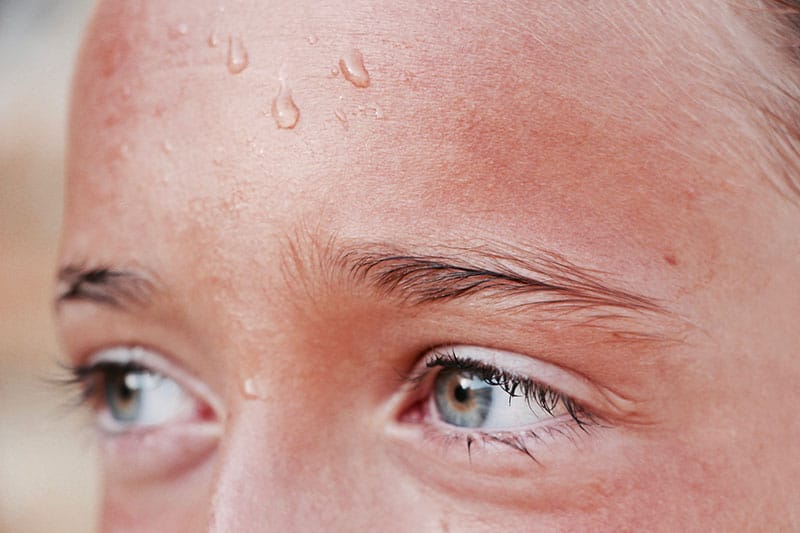The customer service team is always listening, taking notes, and quantifying complaints to ensure our products are continually improved. Due to selling directly to you, the customer, via Amazon, we can use product reviews to help us improve our existing products or help further development of new products.
How Does High Humidity Impact Sweating?
Table of Contents
If you live in an area with high humidity in the summer, you are no stranger to how humidity affects sweating. When the moisture in the air makes it seem difficult to breathe, the sweat stays on the skin instead of evaporating as it ought. Sweating is among the body’s key means of cooling itself, but on a day with a high percentage of relative humidity in the air, sweat simply rests on the skin. Thus, you get the hot and sticky sensation of unevaporated sweat as the body works and works with no relief, which is how humidity causes sweating.
Causes of Sweating
Sweating is a function of the body that assists in regulating its temperature. Also known as perspiration, it is the release of salt-based fluid that emerges from the sweat glands. The most common bodily areas of sweating include the armpits, palms, soles, and face. In normal amounts, sweating is an essential process of the body. This function reduces body heat by means of a process that is called evaporative cooling. The primary cause of increased sweating is high environmental temperature or elevated temperature.
Raised Temperature
The essential purpose of sweat is to maintain the warm-blooded body and keep it from overheating. This is known as thermoregulation. Under normal circumstances, the body sweats out a maximum of a liter and a half each hour, which is just over six cups of salty fluid. In places that are very hot and humid, the human body can adjust within a few weeks and sweat out as much as three and a half liters in an hour, which is nearly a gallon. The high temperature will also lead to high relative humidity. To observe the correlation between them, we could use an indoor temperature and humidity monitor. And we will talk more about it in the following paragraphs.
Exercise
The body heats up swiftly when you work out. This has two reasons. First, contracting the muscles depends on a chemical reaction; only part of the energy is used up by that contraction, however. The rest leaves as body heat. Other chemical reactions are the other reason exercise heats you up: the aerobic metabolism and anaerobic metabolism, the first of which is the body burning sugars, fats, and proteins along with oxygen, the second of which is good for brief bursts of energy.
Emotional Sweat
Certain emotions can also lead to the body breaking out in a heavy sweat. These include anger, embarrassment, fear, emotional stress, and anxiety. Emotions are capable of causing sweating because these strong responses, along with exercise and heat, activate one particular area of the nervous system.
Stress Sweat vs Standard Sweat
There is a difference between standard sweat and sweat from stressing. The eccrine sweat glands release standard sweat when the body is hot. It is made up of salt, water, and potassium, sitting atop the skin to evaporate and cool. When the body reacts to an emotion, it is the apocrine glands releasing the sweat.
This sweat is milkier and is comprised of proteins and fatty acids. Apocrine glands are located near pockets of dense hair follicles in places such as beneath the arms, about the groin, and upon the scalp. This type of sweat initially is odorless, but it is slower to evaporate and can become odoriferous when combined with the skin’s bacteria.
Gustatory Sweat
Another type of sweating is caused by some of the foods people eat. Known as gustatory sweating, this variety of perspiration can be provoked by spicy foods, caffeinated drinks, and alcoholic beverages. A plate of enchiladas or food dipped into a tangy sauce can cause gustatory sweat to bead the forehead.
Foods Raising Temperatures
The most common reason for this perspiration while eating involves spicy foods such as peppers. Peppers contain capsaicin, a chemical that triggers nerves that cause the body to feel warmer. Foods with acidic ingredients such as vinegar, or that are eaten at high temperatures, can also make you sweat.
High-Sugar Meals
On occasion, a high-sugar meal can force the body to create too much insulin; this is the hormone that assists in processing sugar into energy. This can lead to blood sugar plummeting. Known as reactive hypoglycemia, it lists sweating as one of its symptoms.
Medications and Illnesses
Sweating can also have medication use and particular illnesses as its source. These include cancer, both fever and the drugs to bring it down, infection, the aforementioned hypoglycemia, synthetic thyroid hormones, complex regional pain system or CRPS, which is a form of chronic pain that is rare, and painkillers, including morphine.
Antidepressants may cause sweating as well; this is because selective serotonin reuptake inhibitors, or SSRIs, increase levels of serotonin within the brain. Serotonin affects the hypothalamus, which sets the core temperature deciding when sweating will occur, and the spinal cord. Opioids are known to cause sweating as well. This is because they stimulate mast cells, a type of immune cell, to release histamine, which is the chemical that is involved with inflammation. This leads to sweating.
Menopause
Hot flashes, as well as night sweats, occur during and even before menopause. This is because of hormone levels that are changing, including progesterone and estrogen, impacting the body’s control of its temperature. Variations in these hormone levels impact the action of other hormones that are known to regulate the body’s temperature.
The Health Benefits of Sweating

Boosting Endorphins
Sweating does not only stop the body from overheating. It also gives a lift via endorphins. Prolonged sweating is expected at the gym or on a brisk walk in the sun. Exercise increases endorphin hormone levels. Thus sweating is associated with feeling good.
Detoxifies the Body
Among the most efficient means of detoxing the body, without turning to juice, is to sweat it out. Sweating can flush out alcohol, salt, and cholesterol. The body purges toxins by using sweat as a conduit.
Lowers Risk of Kidney Stones
Because sweating can effectively eliminate salt while retaining calcium in the bones, the accumulation of these substances in the urine and kidneys is limited. This is where stones come from. People who sweat have a tendency to drink greater amounts of water and fluids, which is another means of preventing kidney stones.
How Does Humidity Affect Sweating
High relative humidity means the air is already saturated with water. This leads to a slowing of the evaporation of sweat from the skin. Your body cools down more slowly, and in fact, its heat can continue to rise as it overworks. Excessive sweating humidity causes means that core temperatures on the rise; this means that bodies work harder to cool you down. Overheating is a result.
This leads to the body losing salt, water, and chemicals that it needs to function. And this loss can find its way to heat exhaustion caused by chemical imbalances and dehydration within your body. Heat exhaustion leads to the risk of ever more serious heat-related illnesses such as heatstroke.
How to Stop Sweating in Hot and Humid Weather?
Stay Hydrated
This crucial step may seem like common sense, but you cannot afford to overlook it. When it is humid, the body cannot cool down as rapidly, so drinking greater amounts of water is essential. In addition, avoid alcohol or caffeinated beverages, which dehydrate and cause further sweating in humidity.
Limit Outdoor Activities that are Strenuous
Remaining indoors in environments that are air-conditioned is one way to avoid sweating. Avoid spending a great deal of time in the sun. Especially limit activities that are intensely physical. Heat exhaustion and heat stroke, each of which can threaten your life, is a hazard. If you must be active, do so in the cooler parts of days, and keep an eye on the weather report.
Use Antiperspirant
Antiperspirant helps control sweat by clogging the armpits’ sweat glands. Aluminum, which is the active ingredient, dissolves onto the skin’s surface, forming a gel. This gel plugs the glands for the reduction of sweating and prevention of wet markings on clothes. For best results, apply it the night before so the skin has further time to soak up antiperspirant ingredients.
How to Measure Indoor and Outdoor Temperature and Humidity in Hot Summer

Temperatures and the percentage of relative humidity can be measured from 200 feet away with such devices as ThermoPro’s Indoor and Outdoor Thermometer and Hygrometers. Easy to read screens make it simple for you to keep an eye on whether air conditioning should be adjusted or activity levels kept reduced until the humidity is lower. Trend indicator arrows display whether temperatures and humidity percentages are on the rise or falling. Click one of the following indoor and outdoor temperature and humidity monitors to learn more details.
Knowing the facts about thermoregulation can help in knowing how to deal with humidity and sweating. Awareness of the current levels of temperature and humidity also assist with preparation for and facing the muggy heat. Sweat is normal and healthy, in standard amounts. Try to avoid humidity to avoid overheating.









